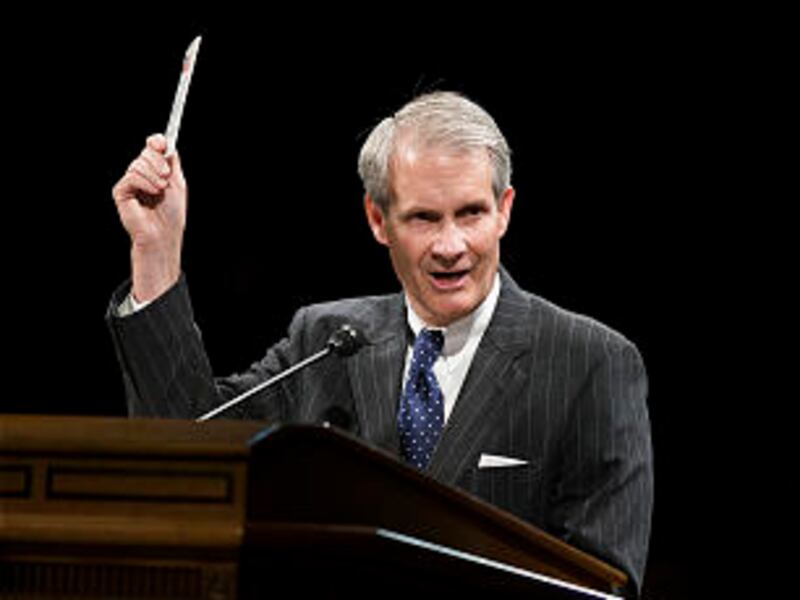President Joe Biden on Friday named Judge Thomas B. Griffith, a BYU graduate and former general counsel at the university in Provo, Utah, to the new Presidential Commission on the Supreme Court of the United States, according to a White House press release.
The White House said Biden’s executive order created the commission to analyze proposals for Supreme Court reform, including whether to increase the court’s size, change how long justices serve and reconsider how justices are selected.
Griffith twice was nominated to the federal judiciary by President George W. Bush, retiring in September after 15 years on the U.S. Court of Appeals for the D.C. Circuit. Griffith, a member of The Church of Jesus Christ of Latter-day Saints, served as BYU’s general counsel from 2000-05.
Griffith was unavailable to comment on the appointment Friday. Judge Paul Cassell, a professor at the University of Utah Law School, said Griffith brings a judicial perspective to the commission, which has 36 members, because he just left the bench.
“As somebody who served in the second-highest court in the land, he has a good understanding of how the Supreme Court interfaces with the rest of the federal judiciary, and also how it interfaces with other courts around the country, so I think his perspective will be a very useful one,” Cassell said.
The D.C. Circuit Court of Appeals is uniquely influential among federal appellate circuits, because it handles appeals from federal government agencies, said Cassell, who served as a law clerk in the D.C. Circuit for the late Supreme Court Justice Antonin Scalia.
“He had a distinguished run there on the court with many distinguished opinions,” Cassell said of Griffith. “It’s quite an honor for somebody from Utah to be placed on that court.”
Republicans assailed the commission as a step toward “packing the court,” expanding the number of justices with Biden nominees.
Some members of Utah’s fully Republican delegation were among those who expressed concern about Friday’s executive order.
“My Democrat friends decry the last president for weakening our institutions with his words and behavior but they now cheer the effort to pack the Supreme Court and end the Senate filibuster, which would forever diminish institutions at our Republic’s foundation,” Sen. Mitt Romney, R-Utah, said in a statement provided to the Deseret News.
Romney is a cosponsor of a bill to pass a constitutional amendment to limit the Supreme Court to nine justices. The bill was reintroduced in Congress in January.
Rep. John Curtis, R-Utah, tweeted that “court packing will only diminish the integrity of the Supreme Court and, as Justice Breyer indicated, politicize the court and damage public trust in its rulings.”
Griffith adds bipartisanship to the commission.
“It is clear that he was appointed by a Republican president to serve on the bench, so I think he may have a different perspective than some of the others,” the professor said. “... I do think that there are some diverse points of view on the commission, but I think we have to acknowledge that it’s heavily slanted to left-thinking individuals.”
Other commission members include Harvard constitutional law expert Laurence Tribe, former assistant Attorney General and former acting U.S. Solicitor General Walter Dellinger and former chief of staff to the White House Counsel’s Office Kate Andrias.
The White House said the commission’s work will be done in public meetings, where it will hear from other experts and perspectives. The executive order directs the commission to complete its report within 180 days of its first public meeting.
The White House also said the Biden administration will study other measures to improve the federal judiciary.
Griffith now is special counsel at the international law firm Hunton Andrews Kurth and a Harvard Law School lecturer.
The bio of Griffith released by the White House included past positions he has held regarding judicial performance and standards:
Thomas B. Griffith served on the U.S. Court of Appeals for the D.C. Circuit from 2005–2020. He is now Special Counsel at Hunton Andrews Kurth, a Senior Advisor to the National Institute for Civil Discourse, and a Lecturer on Law at Harvard Law School. During his tenure on the D.C. Circuit, Judge Griffith served on the Judicial Conference’s Committee on the Judicial Branch, which is concerned with the federal judiciary’s relationship to the Executive Branch and Congress, and the Code of Conduct Committee, which sets the ethical standards that govern the federal judiciary. Prior to his appointment to the D.C. Circuit, Judge Griffith was the General Counsel of Brigham Young University. Previously he served as Senate Legal Counsel, the nonpartisan chief legal officer of the U.S. Senate, and before that was a partner at Wiley, Rein & Fielding. Judge Griffith has long been active in the American Bar Association’s rule of law projects in Eastern Europe and Eurasia and is currently a member of the International Advisory Board of the CEELI Institute in Prague. He is a graduate of Brigham Young University and the University of Virginia School of Law.


